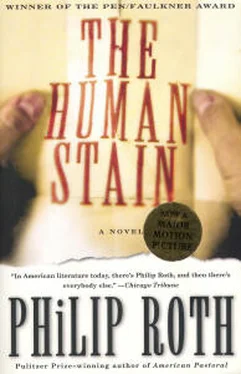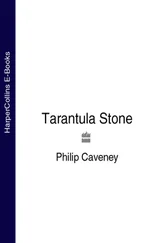On Smoky's other side was a woman I took to be his wife, a pretty blonde of about forty and, if I remembered correctly, an Athena classmate Smoky had married back in the seventies and the mother now of their five children. The Hollenbecks were among the youngest people, aside from Coleman's family, whom I saw in the chapel when I began to look around me. Largely there were Athena elders, college faculty and staff whom Coleman had known for close to forty years before Iris's death and his resignation. What would he think about these old-timers showing up at Rishanger to see him off could he observe them seated before his coffin? Probably something like, “What a wonderful occasion for self-approval. How virtuous they all must feel for not holding against me my contempt for them.”
It was strange to think, while seated there with all his colleagues, that people so well educated and professionally civil should have fallen so willingly for the venerable human dream of a situation in which one man can embody evil. Yet there is this need, and it is undying and it is profound.
When the outside door was pulled shut and the Silks took their seats in the front row, I saw that the chapel was almost two-thirds full, three hundred people, maybe more, waiting for this ancient and natural human event to absorb their terror about the end of life. I saw, too, that Mark Silk, alone among his brothers, was wearing a skullcap.
Probably like most everyone else, I was expecting one of Coleman's children to mount the pulpit and speak first. But there was to be only one speaker that morning, and that was Herb Keble, the political scientist hired by Dean Silk as Athena's first black professor. Obviously Keble had been chosen by the family for the reason the family had chosen Rishanger for the service: to rehabilitate their father's name, to push back the Athena calendar and restore to Coleman his former status and prestige. When I recalled the severity with which Jeff and Michael had each taken my hand and acknowledged me by name and told me, “Thank you for coming — it means everything to the family that you're here,” and when I imagined that they must have repeated something like that to each individual mourner, among whom there were many people they had known since childhood, I thought, And they don't intend to quit, not until the administration building is rededicated as Coleman Silk Hall.
That the place was nearly full was probably no chance occurrence. They must have been on the phone ever since the crash, mourners being rounded up the way voters used to be herded to the polls when the old Mayor Daley was running Chicago. And how they must have worked over Keble, whom Coleman had especially despised, to induce him voluntarily to proffer himself as the scapegoat for Athena's sins. The more I thought about these Silk boys twisting Keble's arm, intimidating him, shouting at him, denouncing him, perhaps even outright threatening him because of the way he had betrayed their father two years back, the more I liked them — and the more I liked Coleman for having sired two big, firm, smart fellows who were not reluctant to do what had to be done to turn his reputation right side out. These two were going to help put Les Farley away for the rest of his life.
Or so I was able to believe until the next afternoon, just before they left town, when — no less bluntly persuasive with me than I'd imagined them to have been with Keble — they let me know that I was to knock it off: to forget about Les Farley and the circumstances of the accident and about urging any further investigation by the police. They could not have made clearer that their disapproval would be boundless if their father's affair with Faunia Farley were to become the focal point of a courtroom trial instigated by my importuning. Faunia Farley's was a name they never wanted to hear again, least of all in a scandalous trial that would be written up sensationally in the local papers and lodged indelibly in local memory and that would leave Coleman Silk Hall forever a dream.
“She is not the ideal woman to have linked with our father's legacy,” Jeffrey told me. “Our mother is,” said Michael. “This cheap little cunt has nothing to do with anything.” “Nothing,” Jeffrey reiterated. It was hard to believe, given the ardor and the resolve, that out in California they were college science professors. You would have thought they ran Twentieth Century Fox.
Herb Keble was a slender, very dark man, elderly now, a bit stiff-gaited, though seemingly in no way stooped or hobbled by illness, and with something of the earnestness of the black preacher in both the stern bearing and the ominous, hanging-judge voice. He had only to say “My name is Herbert Keble” to cast his spell; he had only, from behind the podium, to stare silently at Coleman's coffin and then to turn to the congregation and announce who he was to invoke that realm of feeling associated with the declamation of the holy psalms. He was austere in the way the edge of a blade is austere — menacing to you if you don't handle it with the utmost care. Altogether the man was impressive, in demeanor and appearance both, and one could see where Coleman might have hired him to break the color barrier at Athena for something like the same reasons that Branch Rickey had hired Jackie Robinson to be organized baseball's first black. Imagining the Silk boys browbeating Herb Keble into doing their bidding wasn't that easy, at first, not until you took into account the appeal of self-drama to a personality marked so clearly by the vanity of those authorized to administer the sacraments. He very much displayed the authority of the second in power to the sovereign.
“My name is Herbert Keble,” he began. “I am chairman of the Political Science Department. In 1996, I was among those who did not see fit to rise to Coleman's defense when he was accused of racism — I, who had come to Athena sixteen years earlier, the very year that Coleman Silk was appointed dean of faculty; I, who was Dean Silk's first academic appointment. Much too tardily, I stand before you to censure myself for having failed my friend and patron, and to do what I can — again, much too tardily — to begin to attempt to right the wrong, the grievous, the contemptible wrong, that was done to him by Athena College”.
“At the time of the alleged racist incident, I told Coleman, 'I can't be with you on this.' I said it to him deliberately, though perhaps not entirely for the opportunistic, careerist, or cowardly reasons that he was so quick to assume to be mine. I thought then that I could do more for Coleman's cause by working behind the scenes to defuse the opposition than by openly allying myself with him in public, and being rendered impotent, as I surely would have been, by that all-purpose, know-nothing weapon of a sobriquet, ‘Uncle Tom.’ I thought that I could be the voice of reason from within — rather than without — the ranks of those whose outrage over Coleman's alleged racist remark provoked them into unfairly defaming him and the college for what were the failures of two students. I thought that if I was shrewd enough and patient enough I could cool the passions, if not of the most extreme of his adversaries, then of those thoughtful, level-headed members of our local African American community and their white sympathizers, whose antagonism was never really more than reflexive and ephemeral. I thought that, in time — and, I hoped, in less time rather than more — I could initiate a dialogue between Coleman and his accusers that would lead to the promulgation of a statement identifying the nature of the misunderstanding that had given rise to the conflict, and thereby bring this regrettable incident to something like a just conclusion”.
“I was wrong. I should never have said to my friend, 'I can't be with you on this.' I should have said, ‘I must be with you.’ I should have worked to oppose his enemies not insidiously and misguidedly from within but forthrightly and honestly from without — from where he could have taken heart at the expression of support instead of being left to nurse the crushing sense of abandonment that festered into the wound that led to his alienation from his colleagues, to his resignation from the college, and from there to the self-destructive isolation which, I am convinced — horrible as believing this is for me — led not too circuitously to his dying as tragically, wastefully, and unnecessarily as he did in that car the other night. I should have spoken up to say what I want to say now in the presence of his former colleagues, associates, and staff, and to say, especially, in the presence of his children, Jeff and Mike, who are here from California, and Mark and Lisa, who are here from New York — and to say, as the senior African American member of the Athena faculty:”
Читать дальше












